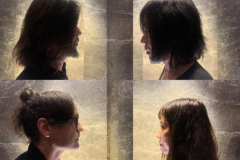Spacemoth – a.k.a. Bay Area-based artist, performer and composer Maryam Qudus – announces that she’s signed to Sadie Dupuis’ label Wax Nine via Carpark Records, and will release her debut album No Past No Future on July 22nd. As a first-generation Afghan-American child of working-class immigrant parents, finding a place in music was nothing short of a challenge for Qudus. “Women are often discouraged from pursuing music in the Afghan & Muslim community, and those who follow that path receive a lot of heat,” she explains. Qudus has spent years building a reputation as a sought-after producer and studio engineer, collaborating with the likes of Toro y Moi, Tune-Yards, Sasami, Sadie Dupuis of Speedy Ortiz, and more, and working at San Francisco’s Women’s Audio Mission and the iconic Tiny Telephone Recording. Aside from her prominent work producing and engineering the sonic explorations of her peers, Qudus has also masterfully constructed her own vision with the psychedelic space-pop of Spacemoth.
Spacemoth shares the double single “Pipe and Pistol” and the previously released “This Shit.” On “Pipe and Pistol,” Qudus explores the experience of being an immigrant starting over in America. The song showcases punchy rhythms, reminiscent of Devo’s post-punk dynamism: “I see your face / my powers, they raise,” she sings with potency.
On the track, Qudus says, “‘Pipe and Pistol’ revolves around a wobbly synth and distorted drum loop, played with and processed by a Korg MS-20. The song was inspired by my parents, who immigrated from Afghanistan in the late 70’s and explores the challenges faced when building a new life in America. Interweaving colorful psychedelic visuals and blue collar employment, Ambar Navarro’s video for ‘Pipe and Pistol’ speaks to the surreal and confusing experience of navigating a new life in America in the late 1970’s.”
Rich in intergalactic, avant-pop, No Past No Future serves as a reckoning point between nostalgia and nihilism; it explores the struggle to hang on to a moment as it warps in time. The bulk of performance and production comes from Qudus herself, who favors vintage synths like the Yamaha CS-50 and Korg Polysix alongside fluttering tape manipulations; creating cosmic, lush soundbeds, drawing comparisons to beloved projects like Broadcast and Stereolab. Every track flows with Qudus’ low timbered vocals, in harmony with the watery, glowing synthesizers that anchor the album. The result is an album radiating in astonishment at the emotional landscape humans contain within ourselves, and in wonder at the preciousness of our time on earth.
Photo Courtesy: Pooneh Ghana












Social Media